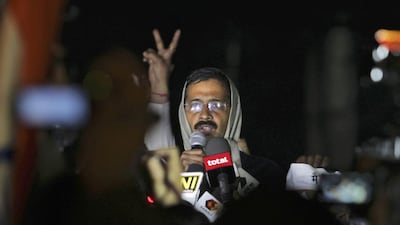You have been desperately seeking political change for years, yet you can’t wait for it. You want a fresh approach to problem-solving, yet you don’t like it when someone thinks of an outside-of-the-box solution. You feel claustrophobic in a culture of corruption, yet you resent those that seek to rid you of the scourge. You can endure oppression for years, but you lose all your patience when the opportunity to end it arrives.
Welcome to India, where contradiction is the name of the game. Nothing exemplifies this phenomenon better than the predicament of Aam Aadmi Party (AAP) which after creating history barely a month ago by trouncing Congress and the BJP in Delhi is facing vociferous criticism and widespread resentment: media brouhaha has turned into a voice of disfavour, political opponents have upped their ante by upgrading accusations to mudslinging, and the "aam aadmi" – the common man – whose overwhelming faith brought the party to power has now become cynical.
At the core of the discontent lies AAP's uneasy alliance with Congress, whose poor performance in governance was among the main planks on which the party contested the Delhi election in December. Ironically, it's the cheerleaders that chastised the AAP supremo, Arvind Kejriwal, when he refused to strike an alliance with Congress to form a government in Delhi who are accusing him of shunning responsibility and capitalising on public sentiment to test the waters before the national election.
There is little doubt that the anti-corruption agenda is a narrow one for any political party to sustain itself. Yet it’s the most important one in India, which is why no major party has ever dared to underplay it.
There are other reasons for indignation, including Mr Kejriwal’s efforts to live up to his pre-poll promises. One of the them was his refusal to take high-security cover. No one had doubts that the intention was noble: to cut down on expenses, as well as to send a message to other politicians that it’s the common man who needs more security in the sate. Such a stand could have grave consequences and the chief minister wasn’t oblivious to this fact. As he sticks to his words, the electorate is singing a different tune, yet again accusing him of irresponsibility. To protect them, they reasoned, the chief minister needs to protect himself.
More recently, the party came under attack for what was popularly termed “political vigilantism”, first when the women and child welfare minister, Rakhi Birla, tried to pressure police into arresting the in-laws of a woman who had been allegedly burnt by them, and later when the law minister, Somnath Bharti, and his supporters tried to coax law enforcers into conducting a late-night raid on a Delhi building housing African women who allegedly dealt in drugs and ran a prostitution racket.
To make matters worse, Mr Kejriwal and his party supporters staged a massive protest last week demanding action against those policemen who refused to carry out the raid, bringing the capital to a halt. Accusing the police of complicity in crime, the chief minister ruled out any negotiations to scale down the agitation, arguing that the “safety of women in the capital is not a matter of negotiation”. This action raised criticism that eclipsed the voice of protest. Hasn’t this been a consistent demand of the people since the brutal rape and murder of a woman in Delhi in 2012?
It’s true that Mr Bharti and Mr Kejriwal could have easily raised the issue with law-enforcement officials and sought an investigation, instead of themselves taking a shot at instant justice. But time and again, similar investigations have proved unhelpful to improve the system. That said, AAP’s mandate is for improving the system of governance, not undermining the law. And Mr Kejriwal is no fool. In media interviews, he has acknowledged mistakes, saying “we may have shortcomings and lack vision, but our intentions are pure”. So far, there is little evidence to prove otherwise.
The reality is that Delhi needs change, India needs change. For that reason, experiments like the AAP need more support than traditional institutions. They will surely disrupt the established pattern of life, making many people frustrated. But then any radical change – be it in society or politics – is unlikely to come smoothly. Therefore, it would be wise on part of the Indian people to show patience and consistency. The biggest satisfaction could be that, after years of inaction and misrule, someone seems to be making a genuine effort to turn things around.
smukherjee@thenational.ae

